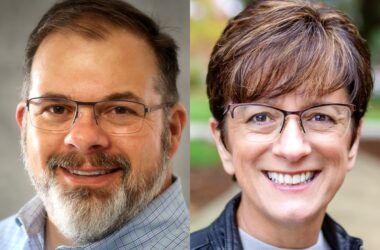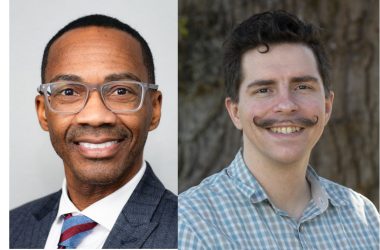South Salem Residents said they wanted better pedestrian and traffic infrastructure, more affordable housing and more homeless services in a first-of-its kind town hall Tuesday night.
City councilors from south Salem gathered to hear questions and top concerns, discussing everything from housing to parking to a problem street light.
Councilor Vanessa Nordyke, Ward 7, organized the town hall and was joined by councilors Linda Nishioka, Ward 2, and Deanna Gwyn, Ward 4. Around 100 residents attended, including several neighborhood association representatives.
The event came three months after Nordyke attempted to get $5,000 from the city to host a larger town hall, which failed in a 3-5 vote in August. Nordyke said the event would build community trust, but councilors opposed cited the cost and burden on city staff.
Instead, Nordyke said Tuesday night’s event at Westminster Presbyterian Church had a budget of around $50 to provide food. Attendees snacked on provided pizza and pumpkin pie during opening remarks from Nordyke. Almost every chair was filled, with over a dozen people standing in the back of the room.
Nordyke’s opening presentation asked the attendees what they wanted to see from their city by show of hands. When asked if the city should only fund police and fire, no one raised their hands. When she asked the room to share why, people shouted out that children, seniors, homeless and anyone who drinks water or uses roads would be impacted.
During a later question, a few people raised their hands to say they don’t think the city should provide tax incentives to businesses which prompted some muttering.
By show of hands, most of the room said they wanted the city to provide a mobile crisis team with social workers and medical professionals to respond to distress calls regarding mental illness, homelessness or addiction. Marion County officials are struggling to hire a team for a program announced last November. Nordyke has pressed for the city to start its own program for years without success.
Most in attendance also said they believed it’s the city’s responsibility to address homelessness.
“This is the most fascinating response so far, because when I first got involved in the city years ago, that was the city’s attitude: ‘not our problem, we don’t do that,’” Nordyke said. She said when she joined the council in 2019, she was told there would never be a managed shelter site in the city. “But now we went from zero to three.”
The city uses federal Covid relief money and state dollars to fund the Navigation Center, micro shelters, emergency warming shelters and the Safe Park program. That funding is set to run out in the next few years. With voters rejecting a city payroll tax Tuesday night, it’s likely that the city will pull its funding from those services in order to preserve its general fund amidst a deficit, though cuts and budget discussions at City Hall will continue.
City leadership, including City Manager Keith Stahley and Mayor Chris Hoy, have said funding homeless services should be the responsibility of state or county, rather than the city.
Councilors also shared information about the work of the Salem Housing Authority, and recent low-income developments it manages including Yaquina Hall and Sequoia Crossings.
“Salem, in reality, is not affordable for any of us,” said Gwyn, who works as a real estate broker. “Our prices have gone up, that all of us are struggling, right? I mean the median price right now is close to $480,000 for a single family residence.”
Nishioka and Gwyn gave a joint presentation, explaining affordable housing programs, and developer incentives such as deferring taxes.
When the councilors opened up the Q&A portion of the town hall, over ten people lined up right away.
Some residents had technical questions about affordable housing thresholds which the councilors said they’d refer to city staff.
“We’re doing this with a budget of 50 bucks tonight,” Nordyke said. “I would love to do a town hall with the benefit of city staff who can jump up and help us answer more technical questions.”
One resident asked about getting a traffic light on South Liberty Road and South Davis Road, saying the neighborhood association has pushed for it for years. She drew applause from the room.
“This has a very, very long story, ten years in the making on this particular issue and we’ve brought this up with the public works director that neighbors are getting jerked around on this and this is unacceptable,” Nordyke said. “So stay tuned, we’ll have more updates for you.”
Another resident asked about walkable access to grocery stores. Councilors said the city role is limited to tax incentives, and business placement is up to developers.
“Downtown has been asking and asking and asking, so it’s on their radar and they’ve been asked before, but grocery stores will look and then they walk away,” Nishioka said.
A resident asked about regulating costs for seniors living in mobile home parks, who own their homes but not the land they sit on which have increasing rents. She asked councilors to consider them at risk of homelessness. Councilors said they would look into it.
Budget Committee Member Andrew Cohen asked the final question of the event: what’s next at the end of the night, when the payroll tax fails. It would be several hours until the results showed over 82% of Salem voters rejecting the tax.
Nordyke and Gwyn originally voted against imposing the payroll tax without taking it to voters, while Nishioka supported it.
Nordyke said she wants to see vacant positions cut at the city, a position she has shared during city council discussions of next steps. The city plans to convene a revenue task force in the winter to explore alternative ways to get money for the general fund.
Gwyn said the city council needs to establish its priorities.
“Probably the main issues that folks had with the payroll tax was it didn’t take into account everyone, so it wasn’t really equitable,” she said, and would impact people making just above minimum wage. “So we have to find something that’s equitable.”
Nishioka said the tax was an attempt to get funds from 70,000 workers who commute into Salem, which includes state employees.
“Nobody likes taxes, but we need to find a way to get the revenue we need to provide to the services, the streets, to the parks, for everything that you’d want,” she said.
After the town hall, many attendees stayed behind to mingle, some attending the Southwest Association of Neighbors meeting right afterward.
Contact reporter Abbey McDonald: [email protected] or 503-704-0355.
SUPPORT OUR WORK – We depend on subscribers for resources to report on Salem with care and depth, fairness and accuracy. Subscribe today to get our daily newsletters and more. Click I want to subscribe!

Abbey McDonald joined the Salem Reporter in 2022. She previously worked as the business reporter at The Astorian, where she covered labor issues, health care and social services. A University of Oregon grad, she has also reported for the Malheur Enterprise, The News-Review and Willamette Week.









